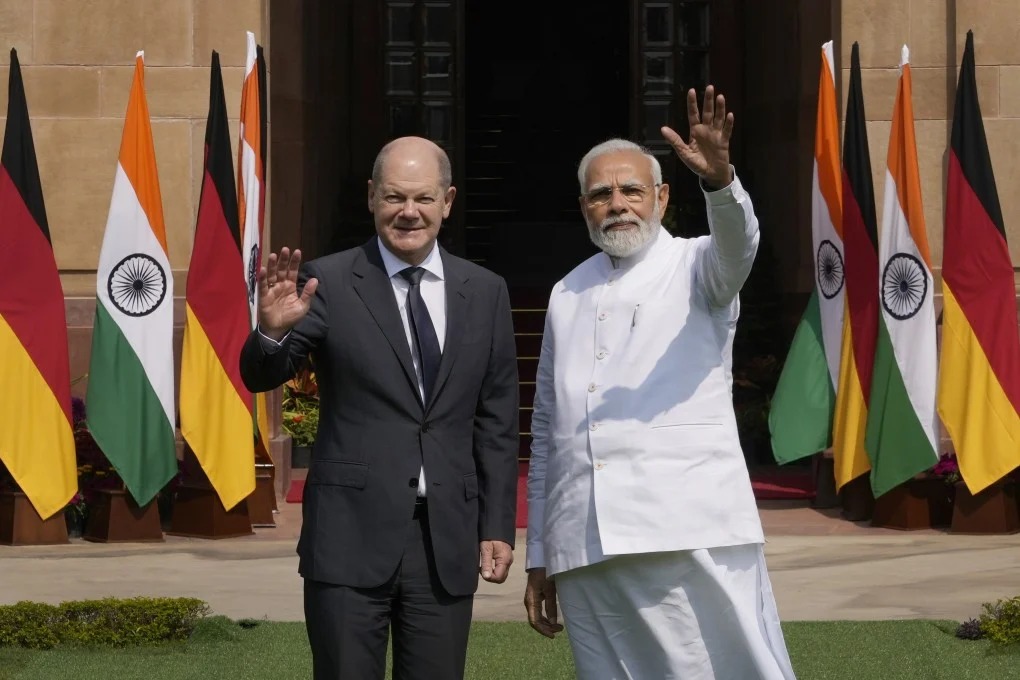 Image Source : South China Morning Post
Image Source : South China Morning Post
In a significant boost to Indo-German relations, India’s Foreign Minister warmly welcomed German investments in semiconductor manufacturing, signaling a new chapter of collaboration in high-tech industries. Alongside this, India reciprocated Germany’s recent call to double bilateral trade, reflecting the mutual ambition to deepen economic ties and technological partnership. This development comes amidst India’s accelerated focus on building a robust semiconductor ecosystem and expanding its global trade footprint.
Key Highlights Steer Indo-German Economic Momentum
India’s Foreign Minister extended a positive reception to German investments in semiconductor production, underscoring trust in Germany’s technological expertise.
The initiative aims to harness German state-of-the-art semiconductor manufacturing technologies to strengthen India’s chip-making capabilities.
India responded affirmatively to Germany’s proposal to double bilateral trade volumes, aiming to unlock broader economic collaboration.
The trade expansion discussion covers sectors like manufacturing, renewable energy, automotive, pharmaceuticals, and technology exchange.
This engagement is part of India’s strategic push towards becoming a global semiconductor hub, supported by robust government programs and foreign investments.
Promoting Semiconductor Manufacturing: A Strategic Priority
India is actively developing its semiconductor manufacturing industry under the India Semiconductor Mission, backed by substantial investments exceeding billions of dollars. The Semiconductor sector is vital as semiconductors form the backbone of digital technology—from consumer electronics to critical industrial machinery. German investments are expected to accelerate technology transfer, increase skill development, and boost India’s manufacturing ecosystem.
Such collaborations are set to enhance supply chain resilience and reduce dependency on traditional hubs, creating a more diversified and secure global semiconductor supply chain. The recent unveiling of India’s first indigenous semiconductor chip and expansion of fabrication plants exemplify the country’s commitment to this goal.
Broadening Trade Horizons: Doubling Indo-German Commerce
Germany, Europe’s largest economy, proposed doubling bilateral trade with India, recognizing India’s emerging role as a key global market and manufacturing base. India’s positive response marks a shared commitment to deepen commercial ties involving various strategic sectors.
The anticipated increase in trade could generate several benefits:
Creation of new jobs in manufacturing and services on both sides.
Enhanced foreign direct investment flows supporting innovation and industrial growth.
Strengthened technology partnerships, especially in automotive and electronics sectors.
Improved supply chain integration and diversification reducing geopolitical risks.
This move also aligns with evolving global trade dynamics, where both countries seek to reduce dependencies and leverage complementary strengths—India’s growing domestic market and digital economy along with Germany’s engineering and technological excellence.
Economic And Diplomatic Implications
The enhanced Indo-German partnership reflects broader geopolitical and economic strategies to foster resilient supply chains and sustainable industrial growth. Beyond economic gains, such collaborations strengthen diplomatic ties, pave the way for joint R&D initiatives, and enable knowledge sharing in advanced sectors such as semiconductors, artificial intelligence, and clean energy.
Germany’s investments coupled with India’s ambitious semiconductor projects and trade openness position this bilateral relationship as a model of win-win cooperation benefiting multiple stakeholders—from governments to businesses and workers.
Outlook For Industry And Stakeholders
Industry players are optimistic about the implications of this partnership. German companies can leverage India’s scale, innovation capacity, and regulatory reforms to expand manufacturing footprints. Indian firms and startups stand to gain access to cutting-edge technologies, global markets, and investment capital.
With ongoing infrastructure developments and supportive policy frameworks, this high-tech collaboration is anticipated to accelerate India’s transition from a consumer to a manufacture-and-innovate hub. The doubling of bilateral trade ambition further solidifies this trajectory by offering a broader platform for economic exchange and industrial complementarity.
Conclusion
India’s welcoming of German semiconductor manufacturing investments alongside a positive response to doubling bilateral trade volumes marks a vibrant phase in Indo-German relations. This twin development integrates India’s semiconductor ambitions with wider economic diplomacy, fostering industry growth, innovation, and enhanced cooperation. It signals a shared vision for a resilient, technology-driven partnership with substantial economic and strategic benefits for both nations.
Sources: Press Information Bureau, Economic Times, India Briefing, ScanX Trade, PIB.gov.in, The Dialogue, Times of India
Advertisement
Advertisement







